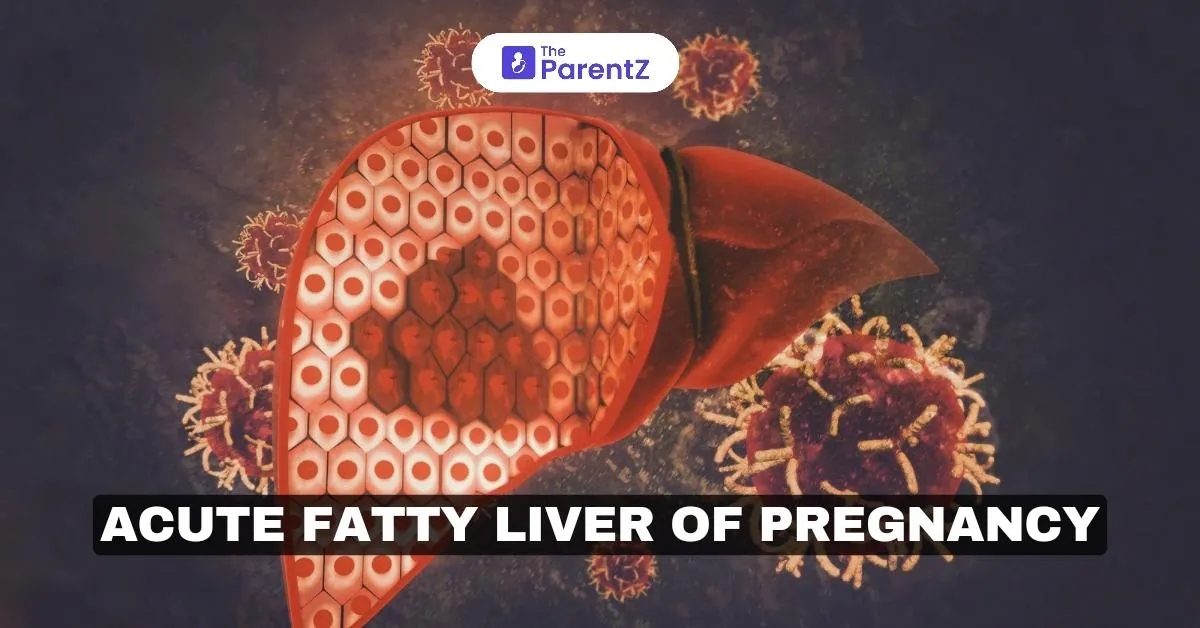Acute Fatty Liver of Pregnancy (AFLP) is a rare and life-threatening complication that affects women in the third trimester or the early postpartum period. It is characterized by the excessive accumulation of fat in liver cells, leading to liver dysfunction and, in severe cases, multi-organ failure. This condition requires early diagnosis and prompt intervention to ensure the safety of both mother and child.
Understanding Fatty Liver
Fatty liver, or hepatic steatosis, occurs when excessive fat builds up in liver cells. It can impair the liver’s normal function and is commonly associated with metabolic disorders, obesity, or alcohol consumption. Fatty liver in pregnancy takes a unique form due to hormonal and metabolic changes, making it critical to recognize the signs early.
What is Acute Fatty Liver of Pregnancy (AFLP)?
AFLP is a rare, pregnancy-specific disorder often linked to genetic factors that impair fatty acid metabolism. In many cases, the condition is associated with a deficiency of the enzyme long-chain 3-hydroxyacyl-CoA dehydrogenase (LCHAD) in the fetus, leading to the accumulation of toxic fatty acids in the mother’s liver.
This disorder typically presents in the third trimester and can escalate rapidly if not treated. AFLP is considered an obstetric emergency requiring immediate delivery of the baby and intensive maternal care.
How Serious is AFLP?
AFLP is a life-threatening condition for both the mother and the unborn child. Without timely intervention, it can lead to:
• Maternal complications: Liver failure, kidney dysfunction, coagulopathy (blood clotting disorders), pancreatitis, and death.
• Fetal complications: Stillbirth, preterm birth, intrauterine growth restriction (IUGR), and neonatal death.
While maternal mortality rates have dropped significantly with advancements in medical care, untreated AFLP still carries a high risk.
Incidence and Prevalence
AFLP is rare, with an incidence of approximately 1 in 7,000 to 1 in 16,000 pregnancies. It is more common in first-time pregnancies, male fetus pregnancies, and in individuals carrying specific genetic mutations affecting fatty acid oxidation.
Symptoms of Acute Fatty Liver of Pregnancy
The symptoms of AFLP can mimic other conditions like preeclampsia or HELLP syndrome, making diagnosis challenging. Common symptoms include:
• Gastrointestinal Symptoms: Persistent nausea, vomiting, upper abdominal pain.
• Jaundice: Yellowing of the skin and eyes, a hallmark sign of liver dysfunction.
• Systemic Symptoms: Fatigue, malaise, and rapid weight gain due to fluid retention.
• Neurological Signs: Confusion, irritability, and in severe cases, seizures or encephalopathy.
• Other Indicators: Dark urine, pale stools, and hypertension.
Diagnostic Criteria for AFLP
Diagnosis involves clinical evaluation supported by laboratory and imaging studies. Common diagnostic tools include:
1. Blood Tests:
• Elevated liver enzymes (ALT and AST).
• Hyperbilirubinemia (increased bilirubin levels).
• Hypoglycemia (low blood sugar).
• Coagulopathy (prolonged clotting times).
• Leukocytosis (high white blood cell count).
2. Imaging:
• Ultrasound or CT scans may show fatty infiltration of the liver.
3. Swansea Criteria:
A set of clinical and laboratory findings used to diagnose AFLP. A diagnosis is confirmed if six or more of the following are present:
• Vomiting and abdominal pain.
• Polydipsia (excessive thirst) or polyuria (frequent urination).
• Hypoglycemia, encephalopathy, or jaundice.
• Elevated liver enzymes and bilirubin.
• Ascites or a bright liver on imaging.
How AFLP Affects the Unborn Child
AFLP can have severe consequences for the unborn child, including:
• Premature birth: Most cases require early delivery to save the mother, leading to preterm-related complications.
• Fetal distress: Reduced oxygen and nutrients due to maternal liver dysfunction can impair growth.
• Stillbirth or neonatal death: Severe cases can result in fetal loss.
Management and Treatment
The primary treatment for AFLP is immediate delivery of the baby, regardless of gestational age, to halt disease progression. Management includes:
1. Stabilizing the Mother:
• Intravenous fluids to maintain hydration and correct electrolyte imbalances.
• Glucose infusion to manage hypoglycemia.
• Blood transfusions to address coagulopathy.
2. Intensive Care:
Patients often require monitoring in an ICU to assess liver and kidney function, respiratory status, and clotting parameters.
3. Post-Delivery Recovery:
• Liver function typically improves after delivery, but close monitoring is essential.
• Supportive care, including nutritional support and management of complications like infections, is crucial.
4. Genetic Counseling:
Families should be offered genetic testing to identify mutations in fatty acid metabolism enzymes and assess future pregnancy risks.
Prevention and Prognosis
While AFLP cannot always be prevented, early recognition and management significantly improve outcomes. Women with a history of AFLP should receive close monitoring in subsequent pregnancies, as recurrence rates are low but possible.
With timely intervention, maternal survival rates exceed 90%, and fetal survival rates are approximately 75%.
Keynotes on AFLP
• AFLP is a rare but life-threatening condition that occurs late in pregnancy.
• Early symptoms like nausea and jaundice should not be ignored.
• Diagnosis relies on clinical signs, laboratory tests, and Swansea criteria.
• Immediate delivery is the definitive treatment to ensure maternal and fetal survival.
• Close monitoring postpartum is essential for both mother and child.
Conclusion
Acute Fatty Liver of Pregnancy is a critical condition that requires a high index of suspicion for early diagnosis and management. Improved awareness among healthcare providers and timely intervention can save the lives of mothers and their unborn children. For women with a history of AFLP, thorough counseling and close monitoring during future pregnancies are essential to prevent recurrence and ensure better outcomes.








Be the first one to comment on this story.